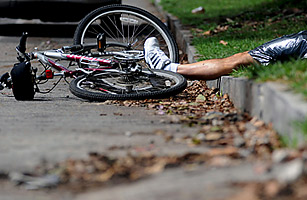By Tim Padgett Monday, Jul. 20, 2009

- The body of lawyer Rodrigo Rosenberg, who was shot by unidentified assailants while riding his bicycle in Guatemala City. — EPA
It’s been five centuries since Pedro de Alvarado, a homicidal Spanish conquistador, seized from the Maya the volcanic realm that became Guatemala. But his bloodlust still haunts the country, which today has one of the highest homicide rates in the western hemisphere. Guatemala’s 36-year-long civil war, which ended in 1996, killed 200,000 people. Its cloak-and-dagger murders have made locals so paranoid that “even the drunks are discreet,” as one 19th century visitor wrote.
That neurosis still shrouds Guatemala City, a gloomy capital that no amount of marimba music can brighten. Rich and poor communities alike are surrounded by walls topped with enough razor wire and rifle-toting guards to look like penitentiaries. This year tandem motorcycle-riding was banned because it was such a popular M.O. for drive-by shootings, and daylight saving time was canceled because the dark mornings created too many opportunities for foul play. Even so, bus drivers face being killed by armed extortionists during rush hour, and lawyers who complain about government corruption can turn up under the bougainvilleas with a few bullets to the head.
That’s apparently what happened to Rodrigo Rosenberg, a corporate lawyer murdered on May 10 while biking near his home. In a twist that’s macabre even for Guatemala, Rosenberg had taped a video three days earlier in which he anticipated his assassination and put the blame on President Alvaro Colom and his imperious wife Sandra Torres. They deny it, saying their right-wing foes coerced Rosenberg into making the video and then had him killed.
But since the shocking video was uploaded to YouTube on May 11, the nation has begun to confront the benighted lawlessness that plagues not only Guatemala but most of the rest of Central America too. Younger Guatemalans, organizing protests via social-networking sites such as Facebook and Twitter, have turned out by the thousands to protest their putrid judicial system and festoon Rosenberg’s murder scene with banners. “Older people say they haven’t seen an awakening like this in 60 years,” says Alejandro Quinteros, 26, a cherubic fast-food manager and political novice who helps lead the National Civic Movement. “We’re not afraid anymore.”
Fear is understandable in a country that feels like a “baroque game of chess played with bodies,” says Francisco Goldman, whose book The Art of Political Murder details the 1998 assassination of Catholic bishop Juan Gerardi, who was bludgeoned to death after issuing a report on army massacres during the civil war. In a nation where just 2% of last year’s 6,200 murders were solved, “impunity opens doors to murderous imaginations,” says Goldman.
But the outcry over the Rosenberg case has opened doors to reform. Guatemala’s congress was compelled to pass a law, long resisted by powerful political and business interests, that allows public scrutiny of judicial appointments. This month lawmakers say they’re set to convene at least one special session to act on measures such as concealed-weapons laws and the creation of organized-crime and anticorruption courts. Activists like Alfonso Abril, 24, of the civic group ProReforma, want to revise Guatemala’s sclerotic constitution to modernize lawmaking and codify individual rights. “I’m from the upper class,” says Abril, “but I know we can’t keep living in a country like this.”
He also knows Guatemalan politics is still treacherous. More than 50 candidates were assassinated during the general election in 2007, the same year three visiting Salvadoran congressmen were murdered by rogue policemen (who were then mysteriously killed themselves). In his video, Rosenberg says his coffee-baron client Khalil Musa was gunned down along with his daughter in April because Musa knew too much about drug-money-laundering. “Rodrigo wanted to talk about the deadly manipulation of laws and lives here,” says his half brother Eduardo Rodas. Guatemala has asked the U.N. and the FBI to investigate his murder. After 500 years, Rosenberg’s ghost may be the first to challenge Alvarado’s.
http://www.time.com/time/magazine/article/0,9171,1909604,00.html





